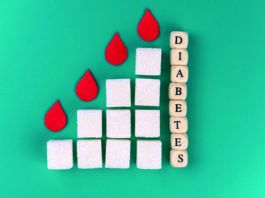New Diabetes Cases Down Again
The number of Americans newly diagnosed with diabetes fell for the fifth straight year in 2014, according to new data from the Centers for Disease Control and Prevention.
Eating at Home Linked to Lower Diabetes Risk
Home cooking may not only stir warm and cozy memories of familiar foods coming from the kitchen - it could also be healthier for you than the modern trend of takeout, fast food and restaurant meals.
Q. Are sugar alcohols OK for people with prediabetes or type-2 diabetes to consume?
Q. Are sugar alcohols OK for people with prediabetes or type-2 diabetes to consume?
Diabetes Rates Up but Increases Slowing
Although US diabetes rates continue to climb, the rate of increase has slowed since 2008, according to a new study in JAMA.
Q. My husbands grandson, who is six years old, has type 1 diabetes. His...
Q. My husbands grandson, who is six years old, has type 1 diabetes. His parents were told by their medical team that carbs are carbs-they should count the carbohydrates the same whether he was eating white bread or whole-grain bread. This would seem to run counter to what Ive read in a number of sources for years. Can you explain, please?
FDA Cracks Down on Coconut Claims
Products containing coconut, coconut oil and coconut milk are popping up everywhere, with marketers touting coconut as the latest superfood. But a recent warning letter from the US Food and Drug Administration cautions coconut boosters not to overreach. The FDA warned that coconut products cant be labeled as healthy if they contain more than 1 gram of saturated fat or more than 15% of calories come from saturated fat. Some have claimed that the saturated fat in coconut is different because its mostly lauric acid, which a few small studies suggest is metabolized differently than other saturated fats. But the FDA isnt buying that argument, noting that coconut products might contain as much as 16 grams of saturated fat per serving.
Eating Tree Nuts Helps Fight Diabetes
A new clinical trial and a review of the evidence both suggest eating tree nuts may help fight diabetes. Tree nuts include walnuts, hazelnuts, almonds, Brazil nuts, cashews, pecans, pine nuts, macadamias and pistachios. One study reported that pistachios improved markers of blood sugar and inflammation in people at risk for diabetes, while the second concluded that tree nuts of various types contribute to better glycemic control in patients already diagnosed with type 2 diabetes.
US Diabetes Rates May Have Plateaued
A new report from the Centers for Disease Control and Prevention suggests the rapid rise in US diabetes rates may be flattening out, possibly due to a similar slowing in increases in obesity. Published in JAMA, the report looked at data on more than 660,000 adults from the National Health Interview Survey. Although incidence of new diagnoses of diabetes had shot up from 3.2 per 1,000 people in 1990 to 8.8 in 2008, that rate actually dropped to 7.1 in 2012. Overall prevalence of diabetes, which rose sharply from 3.5 per 100 Americans to 7.9 from 1990 to 2008, increased only slightly to 8.3 by 2012.
Drinking More Coffee Linked to Lower Diabetes Risk
Go ahead, have another cup of coffee. A new study suggests that increasing your coffee consumption might actually lower your risk of developing diabetes.
The Heart-Brain Blood Supply
Just like every other organ and tissue in the body, the brain needs oxygen and nutrient-rich blood to function properly. Because the brain is so crucial to the bodys survival, it receives a disproportionate amount of blood. Though it takes up only about 2 percent of the bodys weight, the brain receives 15 to 20 percent of the bodys entire blood supply, and 25 percent of its oxygen supply. The body will deprive other parts of the body of blood to ensure that the brain has what it needs.
The heart feeds the brain by sending blood through vessels both on the surface of the brain and deep inside it. Two pairs of arteries branching out from the aorta-the internal carotid arteries and vertebral arteries-supply the brain with blood. Carotid arteries send blood to the front of the brain, and vertebral arteries send blood to the back of the brain.
Blood flow into the brains tissues is a bit different than it is in other parts of the body. Elsewhere in the body, nutrients, oxygen and waste products can move freely in and out of the capillaries. This is not true in the brain. The brain has its own checkpoint, the blood-brain barrier, a semi-permeable system that lets only certain substances pass into the brain. This barrier protects the brain against viruses, toxins, hormones, and other substances in the blood that might harm the brains delicate tissues.
Considering how essential nutrient-rich blood is to the brains function, any disruption in blood flow can pose a serious risk. A blockage in the brains blood supply from a clot either in the brain or from elsewhere in the body is called a stroke. A stroke deprives the affected part of the brain of oxygen. Without oxygen, the brains cells will die. If too many brain cells die, thought and virtually every other function will come to a halt. Two primary risk factors for stroke are high blood pressure and heart disease, which illustrates the close relationship between heart and brain health.
For more information on the connection between the heart and brain, purchase Heart-Brain Diet: Essential Nutrition for Healthy Longevity by Tufts Medical Report.
The heart feeds the brain by sending blood through vessels both on the surface of the brain and deep inside it. Two pairs of arteries branching out from the aorta-the internal carotid arteries and vertebral arteries-supply the brain with blood. Carotid arteries send blood to the front of the brain, and vertebral arteries send blood to the back of the brain.
Blood flow into the brains tissues is a bit different than it is in other parts of the body. Elsewhere in the body, nutrients, oxygen and waste products can move freely in and out of the capillaries. This is not true in the brain. The brain has its own checkpoint, the blood-brain barrier, a semi-permeable system that lets only certain substances pass into the brain. This barrier protects the brain against viruses, toxins, hormones, and other substances in the blood that might harm the brains delicate tissues.
Considering how essential nutrient-rich blood is to the brains function, any disruption in blood flow can pose a serious risk. A blockage in the brains blood supply from a clot either in the brain or from elsewhere in the body is called a stroke. A stroke deprives the affected part of the brain of oxygen. Without oxygen, the brains cells will die. If too many brain cells die, thought and virtually every other function will come to a halt. Two primary risk factors for stroke are high blood pressure and heart disease, which illustrates the close relationship between heart and brain health.
For more information on the connection between the heart and brain, purchase Heart-Brain Diet: Essential Nutrition for Healthy Longevity by Tufts Medical Report.






























